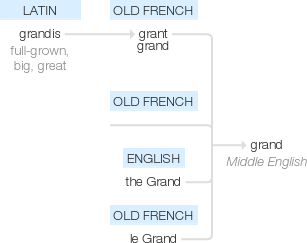Grand
Middle English: from Old French grant, grand, from Latin grandis ‘full-grown, big, great’. The original uses were to denote family relationships (grand (sense 4 of the adjective), following Old French usage) and as a title ( the Grand, translating Old French le Grand ); hence the senses ‘of the highest rank’, ‘of great importance’.
wiktionary
From Middle English grand, grond, graund, graunt, from Anglo-Norman graunt, from Old French grant, from Latin grandis. Doublet of grande and grandee.
From granddaughter, grandfather, grandmother, grandson, etc.
etymonline
grand (adj.)
late 14c., grant "large, big" (early 12c. in surnames), from Anglo-French graunt and directly from Old French grant, grand (10c., Modern French grand) "large, tall; grown-up; great, powerful, important; strict, severe; extensive; numerous," from Latin grandis "big, great; full, abundant," also "full-grown;" figuratively "strong, powerful, weighty, severe," of unknown origin.
In Vulgar Latin it supplanted magnus and continued in the Romanic languages. The connotations of "noble, sublime, lofty, dignified," etc., were in Latin. In English it developed a special sense of "imposing." Meaning "principal, chief, most important" (especially in titles) is from 1560s; that of "of very high or noble quality" is from 1712. As a general term of admiration, "magnificent, splendid," from 1816. Related: Grander; grandest.
Grand jury is late 15c. Grand piano from 1797. The grand tour of the principal sites of continental Europe, as part of a gentleman's education, is attested by that name from 1660s. The Grand Canyon of the Colorado River in western U.S. was so called by 1869, popularized by Maj. John Wesley Powell, scientific adventurer, who explored it; earlier it had been known as Big Canyon. For grand slam see slam (n.2).
grand (n.)
"thousand dollars," 1915, American English underworld slang, from grand (adj.).
